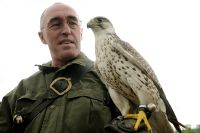SPANGDAHLEM AIR BASE, Germany — F‑16 Fighting Falcons and other aircraft are a common sight here, but if people stop at the right time and place, they might see falcons on the prowl.
These birds and the base falconer serve an important role in controlling pests that pose a bird-strike threat to airborne jets or can damage aircraft on the ground. Ronald Leu of the 52nd Civil Engineer Squadron has been the base falconer here for 10 years. He’s the fulcrum between base officials and the mission-critical predators that keep nuisance populations to tolerable levels. “These birds prey on rabbits, but more importantly, crows,” Leu said. “It’s important to keep airspace clear so the aircraft can fly as normal.” Leu’s job as base falconer is part-time; his primary job is making precision machine parts. The falconer releases trained birds of prey to pursue crows, rabbits and other local wildlife that can pose problems for wing operations. Once the falconer sees that a bird has made a successful catch, he quickly meets with it to limit how much it eats. As long as the bird is still hungry, Leu explained, it will continue hunting in the area. The birds do an excellent job at reducing the numbers of animals that pose threats to aircraft, Leu said. “The birds keep the airspace clear of crows, and this lowers the number of bird strikes,” he said. One bird, Rosie, is especially adept at catching feral cats. “I wouldn’t want to lose Rosie,” Leu said. “She is a very experienced cat hunter. Crows and other birds are much easier to hunt than cats, since [cats] have claws in the front and back, and teeth too.” Although he is only seen on base with the birds two to four times each week, Leu said, a lot of time and effort must be spent training the birds and working with them. “I train them for about a month before we begin, but sometimes it’s less,” he said. “If you buy birds of prey that are already trained, you also buy some other people’s problems.” Training and interacting with birds has been a passion for Leu for years. His interest began at the age of 4, he said, when he would seek books and everything else he could find about birds. He owned his first bird when he was 9, and years later owned many sparrows.
Source:
U.S. Department of Defense
Office of the Assistant Secretary of Defense (Public Affairs)

 von
von 